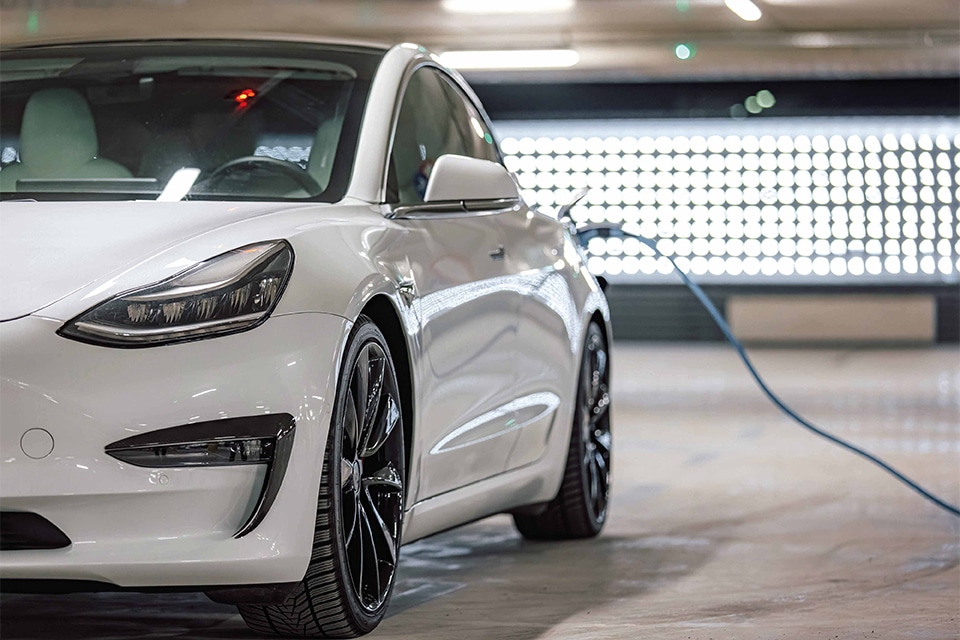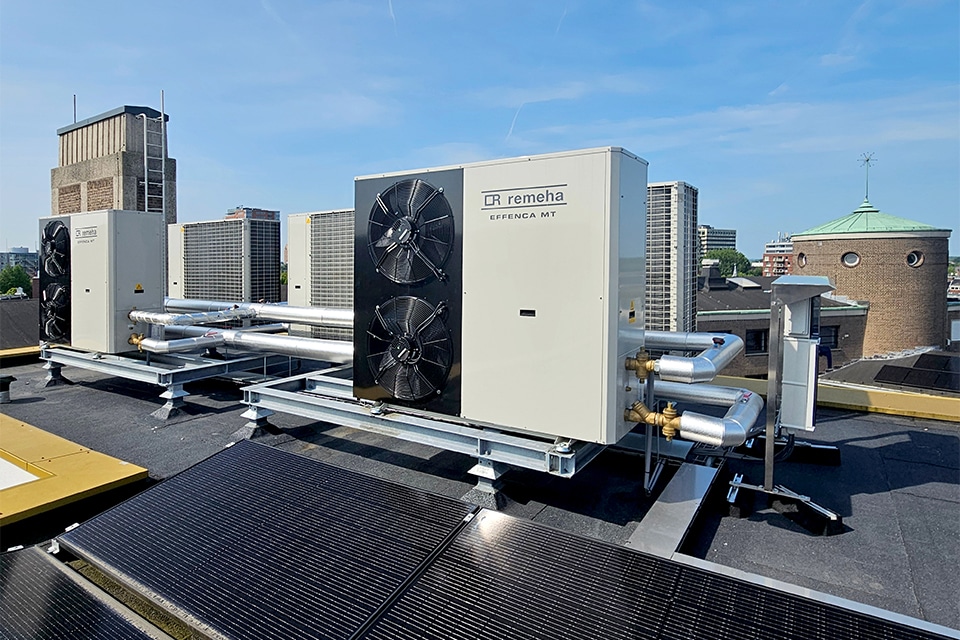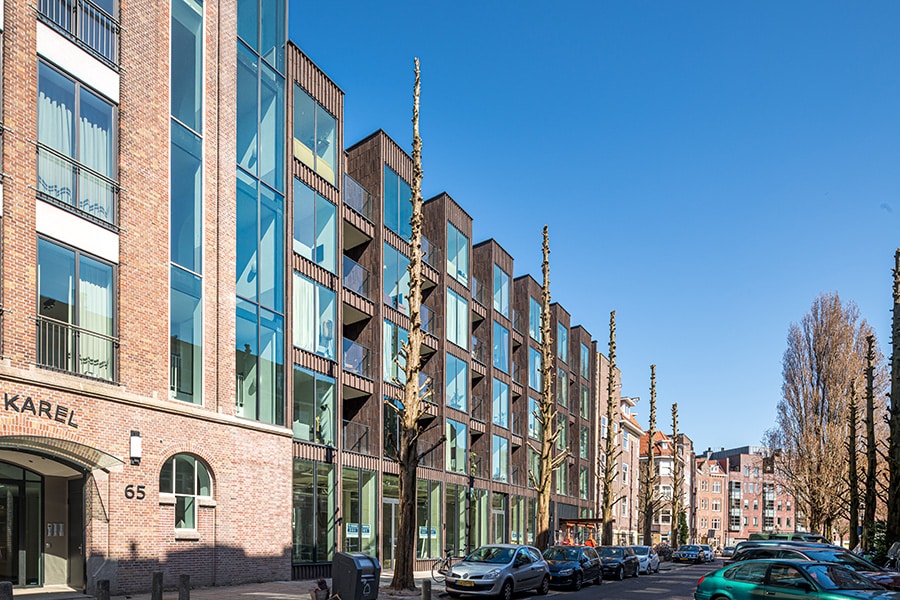
Interview Onno Dwars for Velox magazine
Onno Dwars (1980) is CEO of Ballast Nedam Development, Ballast Nedam's area development company. Velox talks to him about the pioneering role he is playing in accelerating the energy transition. "Our motto is that we can reintroduce the ice age," he says.
How do you feel about the state of the energy transition?
"I am positive, because I have to be. Because the transition is not going fast enough and the climate is changing faster than thought. But the beckoning perspective is so great, I'm hopeful that once we see the light, things will move very quickly."
What needs to happen to really accelerate the transition?
"With prescriptive regulations, everyone automatically gets into action mode. So I think the government needs to set much stricter rules and much more based on the total CO2 budget we have. These small steps that are now being taken from the government are going too slowly, eating up the remaining CO2 budget very quickly. So the government can steer much harder on CO2 budget. The leaders in business are already showing that it can be done."
Can you give an example of what has long been possible?
"When I became managing director of Ballast Nedam Development in 2017, I immediately said, 'We won't do any more projects with gas.' This was finally the hook for the government to say: we're going to put it in the coalition agreement. In 2018, it became law. Then real estate companies squealed for another three months and then it was over and everyone had found a solution. It's really that easy, dare I say it."
Does it perhaps also play into the fact that the construction companies don't really want to?
"No, that has nothing to do with this transition. If a client wants something, construction companies just make it. But those clients are only going to give other orders when the laws change. That's why I believe so much in laws; they have nothing to do with dictatorship, but with the collective regulation of common interests. Because it is our common interest that the mercury does not exceed 40 degrees this summer and that biodiversity is maintained. And it is our common interest that CO2 emissions go down. So for that you have to make collective agreements, so that you get a level playing field. It's really not a rocket science hear."
Is it necessary to create an ecosystem in which knowledge is shared?
"Yes, that is very important. Because our government, and I emphasize 'our' because the government serves the interests of all of us, does not have enough knowledge and know-how in-house to know exactly what is going on in the market. Therefore, there is a responsibility on that market to share knowledge and know-how with the government. I don't see that as lobbying, but as fulfilling a social duty. When we went gasless, I contacted the House of Representatives about that. And recently I visited Minister Hugo de Jonge to explain to him all the standard practices we already apply in the field of nature inclusivity. Shortly after that came the news that the building code is being amended for a basic quality of nature in the living environment. In this initiative I see much of our own approach reflected."
How innovative is Ballast Nedam Development?
"We run pilots with our own projects all the time, without anyone asking. For example, we ran a competition for the climate-positive and biobased Ballast Nedam Development Nature House, those homes will soon be built of straw. We are also working with the university to research the effect of green roofs on energy generation from solar panels. And in Utrecht, we have partnered with Hyundai and We Drive Solar to launch a two-way charging car system. There will eventually be forty cars that will buffer energy and supply it to the built environment. We do these things simply because we see the opportunities. We employ someone who dives into cool new developments and figures out what the costs and benefits are, in terms of marketing value and future value. And then we just go and try it. We are constantly looking at how we can reduce the environmental impact of our buildings. To get an advance on the future, to ultimately be ready for that future. Take our Horizons project: a CO2-negative building of 3,600 tons of CO2. If you compare it to Shell's CO2 offset, that building has a social value of over a million euros. By quantifying the value of buildings in such a way, you can start to have the discussion in a different way."
So buildings can really play a positive role in the transition
"Certainly. Our motto is that we can reintroduce the ice age. It sounds very pretentious, but it's true. With our buildings, we can really eventually move to a carbon-negative environment, rather than carbon-neutral. With a built environment, we can generate more energy than that environment is going to use, so the rest can accelerate sustainability. That's how we all create social value, which we don't have enough visibility in the world right now."
So aren't such projects much more expensive?
"For us they are more expensive, but the social value is also much greater, so viewed integrally they are actually cheaper. Only that integral business case, the incentives, we still have to organize them better together. That's why we are also getting so involved in the CO2 budget, to make sure that people think differently about the pricing of CO2."
Should the construction industry become less hierarchical to speed up the transition, as Jan Rotmans says?
"Maybe I am too much a part of that system, but I do not experience this as the biggest bump. We can accelerate this transition by organizing good incentives and legislation. The fact that we were able to go gas-free had to do with the fact that the investment sector lobbied a lot for other forms of valuation. So a whole financial system has been built around it that provides other incentives: in which sustainability is rewarded. That's why I push so hard for CO2 pricing. With that you create huge incentives in the system to do things differently. Whether construction companies have to become less hierarchical for that, I leave that conclusion to Jan Rotmans."
What does the tight labor market mean for accelerating the energy transition?
"The tightness is a very big problem. Because the whole built environment has to be transformed to make this huge energy reduction happen. Also our new construction task has never been bigger. In addition to climate-adaptive building, the infrastructure has to be adapted: the streets, the sewer systems. We want to maintain the high standard of well-being we have created in the Netherlands with the changing climate. That task is immense. So yes, the tight labor market is a major threat to the transition. But ultimately we will always find solutions to challenges. And it helps to remain ambitious and hopeful. Because if the frontrunners give up, we are lost."
This article previously appeared in the Velox Magazine
Heeft u vragen over dit artikel, project of product?
Neem dan rechtstreeks contact op met Velox.
 Contact opnemen
Contact opnemen



